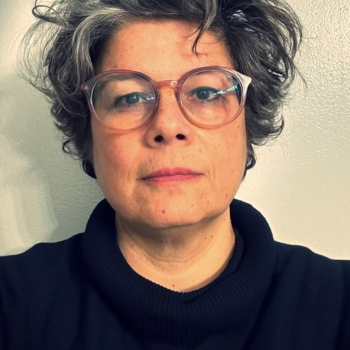

Helga Tawil-Souri
Associate Professor of Media, Culture, and Communication; Associate Professor of Middle East and Islamic Studies
Media, Culture, and Communication
Associate Professor Department of Middle East and Islamic Studies
Helga works on technology, media, culture, territory and politics in the Middle East, with a particular focus on Palestine. Helga is co-editor with Dina Matar of Gaza as Metaphor (Hurst 2016) and Producing Palestine (Bloomsbury 2024), and currently serves on the editorial boards of Social Text, Public Culture, and Journal of Environmental Media. She has published a wide range of articles and chapters on checkpoints, borders, infrastructure, media and telecom, surveillance, and other topics.
Helga teaches courses at undergraduate and graduate levels on topics including borders and spatiality, Arab media, critical theory and media studies, Israel/Palestine, war and media, globalization and international development, public humanities, Middle Eastern cities and urban spaces, and what has been referred to as "the coffee class" (cultural geography of commodities), which is not always about coffee.
Selected Publications
- Tawil-Souri, H. (2024). But I Don't [Love] Genocide. Middle East Journal of Culture and Communication 17.
- Tawil-Souri, H. and D. Matar, eds. (2024). Producing Palestine: The Creative Production of Palestine Through Contemporary Media. Bloomsbury Press.
- Tawil-Souri, H. (2024). Digital Borders. Red Pepper.
- Tawil-Souri, H. (2023). Gaza Screened. In Nadia Yaqub, ed. Gaza On Screen. Duke University Press.
- Tawil-Souri, H. (2023). Borders. In Bilge Yesil and Joe Khalil, eds. Handbook of Media and Culture in the Middle East. Wiley.
- Tawil-Souri, H. (2023). Telephone Lines and The Corridors of Israeli Colonialism. In Ahmad Sa’di and Nur Masalha, eds. Decolonizing the Study of Palestine: Indigenous Perspectives and Settler Colonialism after Elia Zureik. I.B. Tauris.
- Tawil-Souri, H. (2022). Speculation on infrastructural ecology: Pigeons, Gaza, and internet access. Environment and Planning D: Society and Space.
- Mikko Joronen, Helga Tawil-Souri, Merav Amir and Mark Griffiths (2021). Palestinian Futures: Anticipation, Imagination, Embodiments. Geografiska Annaler B: Human Geography.
- Tawil-Souri, H. (2021). Internet Pigeon Network. In M. Sorkin and D. Sharp, eds. Open Gaza. Terreform.
- Tawil-Souri, H. (2019). Dis-Formations of Palestine. In Tarik Sabry and Joe Khalil, eds., Culture, Time and Publics in the Arab World: Media, Public Space and Temporality. I.B. Tauris.
- Tawil-Souri, H. (2018). Checkpoint Time. Qui Parle 26(2).
- Tawil-Souri, H. (2017). Spectrum. Cultural Anthropology.
- Tawil-Souri, H. (2017). Surveillance Sublime: The Security State in Jerusalem. Jerusalem Quarterly 68
- Tawil-Souri, H., & D. Matar, eds. (2016). Gaza as Metaphor. Hurst Publishers.
- Tawil-Souri, H. (2015). Cellular borders: Dis/connecting phone calls in Israel-palestine, in Parks, L. and Starosielski, N. eds., Signal traffic: Critical studies of media infrastructures.
- Tawil-Souri, H. (2014). Cinema as the Space to Transgress Palestine’s Territorial Trap. Middle East Journal of Culture and Communication, 7(2).
- Tawil-Souri, H. and M. Aouragh. (2014). Intifada 3.0? Cyber colonialism and Palestinian resistance. Arab Studies Journal 22.1
- Tawil-Souri, H. (2012). Digital Occupation: Gaza's High-Tech Enclosure. Journal of Palestine Studies 41(2).
- Tawil-Souri. H. (2012). It’s Still About the Power of Place. Middle East Journal of Culture and Communication 5(1).
- Tawil-Souri, H. (2012). Mapping Israel–Palestine. Political Geography, 1(31).
- Tawil-Souri, H. (2011). Where is the political in cultural studies? In Palestine. International Journal of Cultural Studies 14(5).
- Tawil-Souri, H. (2011). Colored Identity: The Politics and Materiality of ID Cards in Palestine/Israel. Social Text 29(2).
- Tawil-Souri, H. (2011). Qalandia Checkpoint as Space and Nonplace. Space and Culture 14(1).
- Tawil-Souri, H. (2009). New Palestinian centers: An ethnography of the 'checkpoint economy'. International Journal of Cultural Studies 12(3).
